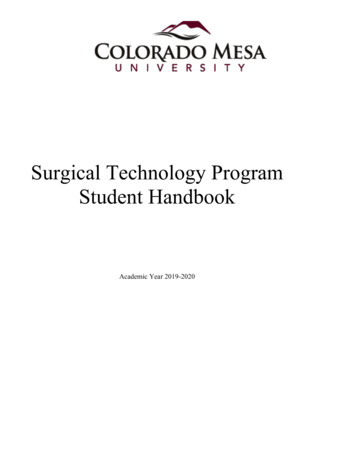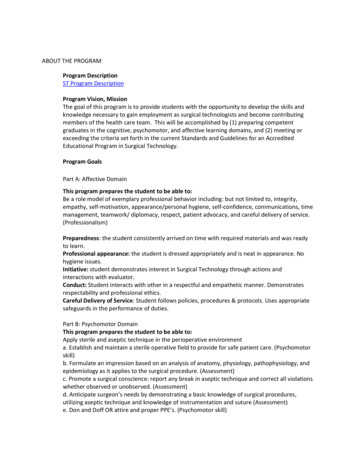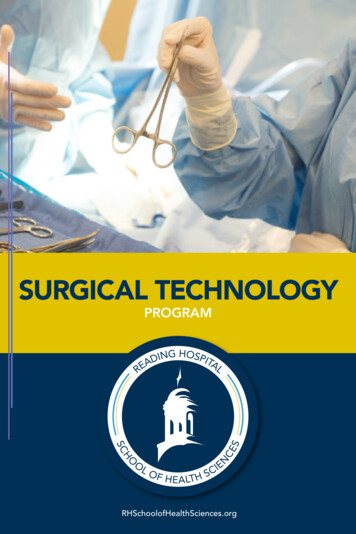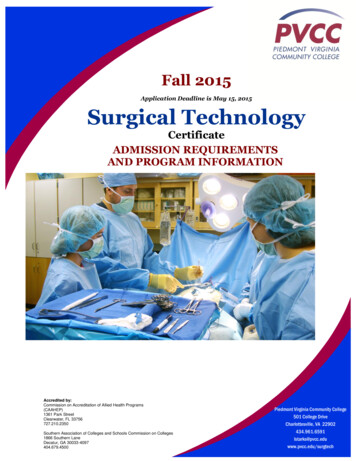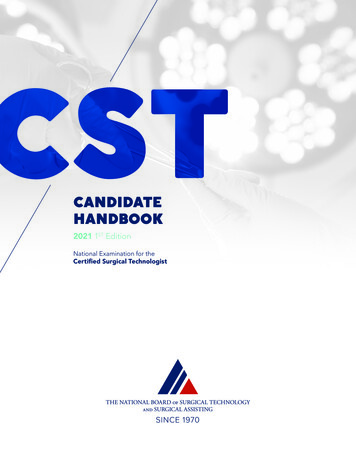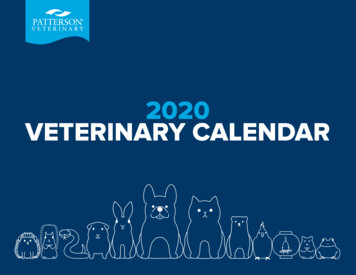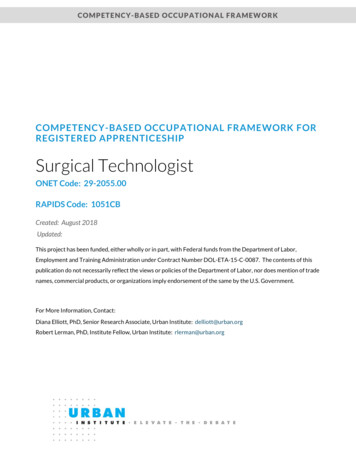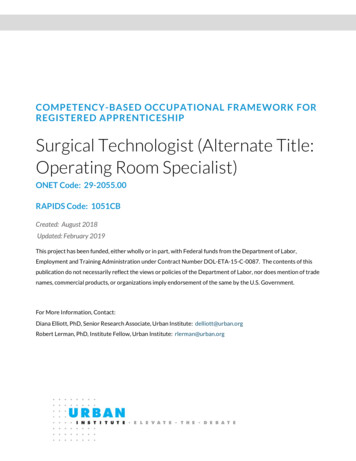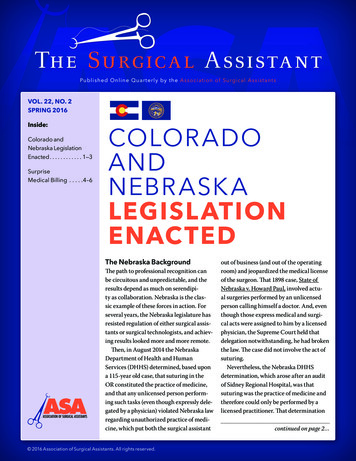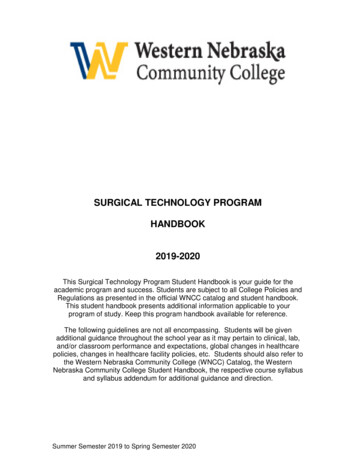
Transcription
SURGICAL TECHNOLOGY PROGRAMHANDBOOK2019-2020This Surgical Technology Program Student Handbook is your guide for theacademic program and success. Students are subject to all College Policies andRegulations as presented in the official WNCC catalog and student handbook.This student handbook presents additional information applicable to yourprogram of study. Keep this program handbook available for reference.The following guidelines are not all encompassing. Students will be givenadditional guidance throughout the school year as it may pertain to clinical, lab,and/or classroom performance and expectations, global changes in healthcarepolicies, changes in healthcare facility policies, etc. Students should also refer tothe Western Nebraska Community College (WNCC) Catalog, the WesternNebraska Community College Student Handbook, the respective course syllabusand syllabus addendum for additional guidance and direction.Summer Semester 2019 to Spring Semester 2020
WESTERN NEBRASKA COMMUNITY COLLEGE HEALTHSCIENCES DIVISION SURGICAL TECHNOLOGYFACULTY AND ADMINISTRATION DIRECTORYDean of Instruction and Workforce DevelopmentCharlie Gregory, PhD . 308-635-6740Surgical Technology Program DirectorMarcene Elwell, BSN, RN, CNOR, CST. 308-254-7431Adjunct FacultyTiffany Conboy, CSTFREQUENTLY USED COLLEGE TELEPHONE NUMBERSWestern Nebraska Community College. 308-635-3606Registrar. . 308-635-6013Tutoring. 308-635-6153Financial Aid. 308-635-6011Library . 308-635-6040Bookstore . 308-635-6066Business Office . 308-635-6020Health Sciences Department . .308-635-60601
Program OverviewThe Surgical Technology Program is an Associate Degree in Applied Scienceprogram. The Surgical Technology Program at WNCC is accredited by theCommission on Accreditation of Allied Health Education Programs(www.caahep.org) upon the recommendation of the Accreditation ReviewCouncil on Education in Surgical Technology and Surgical Assisting. TheProgram is designed to prepare competent entry-level surgical technologists inthe cognitive (knowledge), psychomotor (skills), and affective (behavior) learningdomains. The curriculum includes science courses, that provide the basis forapplication of principles of Surgical Technology. Basic courses in the theoreticalaspects of Surgical Technology encompass lecture, skills labs, clinical, and online instruction.Under the direction of the Program Director, program faculty, and clinicalpreceptors, students are provided with hand-on experience at approved clinicalagencies.Surgical Technologists share responsibility with the faculty, physician residents,nurses, ancillary staff, surgeons, and others, for the welfare of the patient.Professionalism, personal appearance, teamwork, hard skills (technical) and softskills (behavioral) are emphasized throughout this program.Program MissionThe mission of the Surgical Technology Program is to provide a student-centricenvironment that develops professional, qualified, patient advocates prepared tofunction as competent entry level professionals in the field of SurgicalTechnology, becoming life-long learners and contributing positively to thecommunities and agencies they serve.Program GoalsFurthermore, the program strives to meet student learning and employabilitygoals via a combination of general education and comprehensive clinicaleducation utilizing the cognitive, psychomotor and affective learning domains.The Program is committed to preparing graduates to support societal andtechnological advancements, aligning with the college’s mission to modelexcellence in service to the community.2
Program Student Learning Outcomes1. Upon completion of this program students will develop effective interpretationand expression of ideas through written and oral communication the operatingroom. (Affective)2. Upon completion of this program students will employ critical thinking skills intheir identification of variations and analysis of information and/or equipmentduring surgical procedures. (Psychomotor and Cognitive)3. Upon completion of this program, students will be able to demonstrate theability to perform the role of first scrub on all basic general and specialtysurgical cases as defined by the Association of Surgical Technologists (AST).(Psychomotor and Cognitive)4. Upon completion of this program, students will be able to demonstrateapplication of principles of asepsis in a knowledgeable manner that providesfor optimal patient care in the operating room. (Psychomotor)5. Upon completion of the program, students will demonstrate a SurgicalConscience in all aspects of their professional practice (Affective,Psychomotor, and Cognitive)6. Upon completion of the program, students will be able to demonstrate globalpatient care by monitoring the surgical environment along with other teammembers. (Affective, Psychomotor and Cognitive)Program Goals: Cognitive Learning DomainThe graduate Surgical Technologist will:1. Become an integral part of a surgical team providing care to the patientundergoing surgical intervention.2. Identify the structures and functions of the human body and commonly foundpathologies.3. Recognize the value of continued professional and personal growth byparticipating in education and professional activities and the sharing ofknowledge with colleagues.4. Evaluate own performance by identifying strengths and limitations usingstandards of the profession.5. Master and complete specific performance objectives and competencies inthe academic/lab/clinical areas as so stated in the Core Curriculum forSurgical Technology 6th edition.6. Apply for and take the National Certification examination when eligible.3
Psychomotor Learning DomainThe graduate Surgical Technologist will:1.2.3.4.Apply the scientific principles of aseptic technique.Recognize breaks in aseptic technique and take immediate corrective action.Demonstrate practice that reflects the development of a surgical conscience.Participate in the preparation and sterilization of supplies and equipment usedin surgery.5. Participate in the preoperative preparation for a surgical procedure.6. Function in the “First Scrub role” on basic and specialty surgical proceduresas required in the Core Curriculum 6th edition.7. Assist with circulating duties.8. Identify potential and existing safety hazards in the operating roomenvironment.9. Complete mandatory student experience records using correct terminologyand accurate spelling.10. Actively participate in the evaluation process, including self-evaluation.11. Prepare and handle drugs and solutions properly with concern for legalities,under the supervision of a Registered Nurse.12. Apply effective communication skills to a given situation.Affective Learning DomainThe graduate Surgical Technologist will:1. Demonstrate dependability and integrity.2. Display an attitude of empathy and respect for the patient and co-workers.3. Carry out Surgical Technologist duties aseptically, calmly and efficiently in astressful environment.4. Utilize a variety of methods to facilitate personal and professional growth.5. Functions as a surgical technologist throughout a surgical procedure, usingan efficient routine and adhering to hospital policy and best practices.6. Recognize the uniqueness of patients when providing surgical care.7. Utilize critical thinking when providing care to achieve established goals.8. Demonstrate accountability in their practice based on current knowledge inthe field of surgery.4
WNCC Surgical Technology Technical StandardsSurgical Technologists serve as an integral part of the surgical team providingsurgical care to patients. Surgical Technologists work under the supervision of asurgeon to facilitate the safe and effective conduct of surgical procedures. Theseestablished technical standards are provided to the prospective student as aguide to the expected level of competency during the completion of the SurgicalTechnology Program. Graduates of the WNCC Surgical Technology Programmust:1. Demonstrate effective interpretation and expression of ideas throughwritten and oral communication in the operating room. Examples wouldinclude questions and discussions with peers and patients regarding careboth preoperatively and intraoperatively and effective communication withsurgeons and nurses to optimize patient care.2. Apply knowledge and experience (critical thinking skills) in theiridentification of variations and analysis of information and/or equipmentused during surgical procedures. Examples of critical thinking in thesurgical setting include effective prioritization and anticipation skills in thedynamic surgical environment.3. Demonstrate competence in performing the role of first scrub on all basicgeneral and specialty surgical cases as defined by the Association ofSurgical Technologists. Examples include preparation of the sterile fieldwith instruments, supplies, equipment and medication, and passinginstruments and supplies to sterile team members.4. Demonstrate the application of principles of asepsis in a knowledgeablemanner that provides for optimal patient care in the operating room.Examples include the identification of proper aseptic technique andrecognizing breaks in technique.5. Demonstrate a Surgical Conscience in all aspects of their professionalpractice, proficiency and strict adherence to best practice guidelines.Examples include professional accountability and integrity.6. Demonstrate global patient care by monitoring the surgical environmentalong with other team members. Examples include effectivelycommunicating with all members of the surgical team, preoperative team,patients and their families.7. Demonstrate the physical and mental endurance necessary for long-termsurgical procedures.5
Program Policies and GuidelinesStudent ProgressionCore courses within the Surgical Technology program (SURT) must besuccessfully completed in the required sequence in order to progress to the nextsemester.The student must maintain the minimum grade of 2.33 (C ) in any surgicaltechnology course or he/she may not progress to the next semester in the coursesequence. In addition to the required GPA, lab skills-check offs and clinicalperformance must meet minimum standards outlined herein.For successful course completion and graduation, students must:1. Meet all institutional graduation requirments of an Associates of AppliedScience Degree.2. Complete all required coursework for the Surgical Technology curriculumwith a C .3. Successfully pass the Final Lab Skills Check-offs.4. Meet the clinical courses expectations and objectives.5. Complete the National Board of Surgical Technology and SurgicalAssisting National Certification Examination6. Adhere to all College and Program policies and guidelinesThe following grading scale will be applied to all Surgical Technology courses:A AAB BBC 98% - 100% (4.0)95% - 97% (4.0)91% - 94% (3.67)88% - 90% (3.33)85% - 87% (3.0)81% - 84% (2.65)78% - 80% (2.33)C 75% - 77% (2.0)CD DDF 71% - 74% 68% - 70% 65% - 67% 61% - 64% 60%Re-admissionStudents are not automatically guaranteed re-admission into the SurgialTechnology program upon withdrawl or failure. If a student was dismissed basedon a single or multiple serious issues, a panel can permanently deny readmittance based on previous circumstances. The members of this panel areoutlined in the disciplinary action/dismissal policy section of this handbook.-Surgical Technology program courses must be successfully completed in therequired sequence in order to progress to the next semester.6
-The student must maintain the minimum grade of 2.33 (78%, C ) in anysurgical technology course, successfully pass the Final Lab Skills Check-offs,and meet the clinical courses expectations and objectives, or he/she may notprogress to the next semester in the course sequence and will be dropped fromthe program.-Students who do not progress in the program, or who withdraw must apply forre-admission to the program for the following year if eligible. If more than 1 yearelapses the student may re-apply but will have to start the program over, from thebeginning.-If a student intends to re-apply, the entire readmittance process must becompleted (i.e. application, drug screen, background check, etc.).-Students can only attempt the program twice.-Re-admission may be considered if there is available space in the program andif there are available clinical sites. The student who reapplies would go onto thewaitlist chronologically. Clinical site availability may be limited based oninstructor availability.- Any student that is re-admitted will be required to follow the most recentprogram handbook.-The student must communicate, in writing to the surgical technology programdirector (STPD) their intent to re-apply within 3 weeks of course failure orinsufficient course grade. This letter MUST include:1. Why the student was unsuccessful in being eligible to progress or why theywithdrew.2. How the student will remedy the situation, or if/how the situation has beenresolved.3. Why the student believes they will be successful if given another opportunity toprogress.-The student re-applying will be required to complete a skills competencyassessment from the previous term with passing scores (see Final Skills Checkoff score requirements in the Lab section of this handbook). This must be done 1month prior to the time of the re-admittance semester. If the student does notpass the skills competency assessment, they will not be allowed to re-admit andwill have to start the program over as long as they have not attempted theprogram twice already. Practice to prepare will be allowed in the lab 2 times andmay be without instructor/STPD supervision. A time will be scheduled by thestudent and agreed upon by the instructor/STPD. The skills competecyassessment will be recorded and evaluated by the lab instructor, STPD or both.7
Load/Study TimeTime management is key to success in the Surgical Technology program.Students are strongly encouraged to utilize any and all available time forstudy/practice. A three credit course involves at least six hours of work outsideof class every week. Students are reminded that the key to success in theperioperative environment is a practice of self-driven learning and improvement.Students are expected to seek assistance and counseling to improveperformance in this course internal and external to the program resources.CommunicationEffective communication is the hallmark of teamwork, personal accountability,and is of critical importance in the perioperative environment. Students areexpected to communicate weekly, at minimum with faculty and will do soprimarily via email. Student’s are expected to check Black Board and their emaildaily. Text messaging or other forms of electronic communication should beutilized only if other forms are not available. Students must also maintain weeklycommunication with their assigned clinical site contacts regarding pertinentinformation such as tardiness, absences, performance and surgical cases.NBSTSA Secure Practice Examination, National Certification Exam & PostGraduation SurveyAs a condition of graduation, students will be required to participate in theNBSTSA Secure Practice Examination, the National Certification Exam and apost-graduate survey during the final semester. Student success or failure of theexams is irrelevant as it pertains to graduation.AttendanceThe student should enter the Surgical Technology program as if the first day ofclass is their first day on the job. Clinical, lab and classroom attendance iscrucial to success. Due to the nature of the curriculum and academic timelines,students are strongly discouraged from taking leaves of absences that arevoluntary in nature such as; elective medical procedures, family vacations,personal vacations, or other situations that are not emergent or unavoidable.Tardiness and absences can result in unsuccessfull completion of courses. Seespecific course addendum’s for information. No more than 10% of the scheduledclinical experience hours may be missed. Clinical absence(s) exceeding 10%will result in failure of the course.Students must notify their instructor andclinical contact directly not less than 30 minutes prior to clinical or class ifthey will be absent or tardy.8
AppearanceGrooming/appearance standards will be pertinent to both sexes and beapplicable to all courses/events that at which the student is attending orrepresenting WNCC and the Surgical Technology Program.Each Student must wear appropriate (per agency policy) and professional dressto and from the clinical site.Hair should be clean, neat and secured in such a manner that prohibits extensionbeyond surgical head covers. Facial hair should be neatly trimmed andmaintained. Long hair will need to be held back in order to fit into a cap/bonnet.Students should be aware that some clinical agencies may prohibit facial hairdue to improper fit of facial masks. Some facilities may ask that you wear aspecial mask/surgical head covering to contain facial har.Personal cleanliness, use of a deodorant and good oral hygiene is expected at alltimes.Perfumes, cologne and scented hand cream is not permitted.Cosmetics may be worn with discretion.Per the Association of Surgical Technologists Guidelines for Best Practice forWearing Jewelry: Jewelry should not be worn in the O.R. Because the possibilityexists that microbial colonization of the skin under rings can occur and possibletransmission of the microbes places the surgical patient atrisk for acquiring aSSI, it is recommended that the non-sterile and sterile surgical team membersremove all bracelets, earrings, necklaces, rings, and watches prior to entering theOR. In addition, surgery personnel should remove facial and oral jewelry beforeentering the OR. Wearing eyebrow, lip, nose, and tongue piercings present thepotential of dislodging and falling onto a sterile field, and possibly enter thesurgical wound.Nails must be kept clean and short. Artificial nails or fingernail polish will not beworn.No visible body piercings are permitted. This includes tongue piercings. A clear“spacer” may be worn in a pierced nostril.Clinical site grooming and dress code policies will be strictly adhered to. Failureto do so will result in dismissal from the site and could also result in the studentbeing removed from the program.Each student should purchase a pair of shoes that will only be worn at the clinicalsite, shoe covers should be worn in the operating room.Students will be required to purchase surgical scrubs and one long sleeved labjacket. Only the color and style of scrubs as directed by the Program Director willbe acceptable. This scrub attire is required attire for all Surgical Technology lab9
courses. Scrub attire will be kept clean, neat, and present a professionalappearance at all times. Scrub attire will be available at the clinical site.It is also recommended that each student purchase their own protective eyewear.Per OSHA standards, it must be of the wrap around style and adequately coverthe eyes. Those students who wear eyeglasses must also use either protectiveeyewear or side shields.Students are expected to follow the Standard Precautions as recommended bythe Center for Disease Control while in the clinical environment.Health, Illness and InjuryStudents are responsible for their own health needs and expenses incurred incaring for their needs throughout the Program, including immunuzations andtiters required for Program admission.Injury/ExposureIf a student is injured in a clinical area, the incident must be reportedimmediately to the preceptor, instructor, charge nurse and ProgramDirector. Required emergency treatment and appropriate report forms must becompleted. If the student sustains any type of potential exposure to blood bornepathogens, or any other injury, all clinical agency policies and procedures mustbe followed. Injury sustained at school or a clinical site must be reported and anaccident report filled out at both the clinical site and College. A student whoreceives an injury while at clinical are responsible for the healthcare expensesincurred in treatment.Basic Life Support (BLS)BLS preparation must be obtained throught the American Heart Association priorto program admittance. All costs related to obtaining BLS and scheduling a classare the responsibility of the student. BLS must remain active throughout theSurgical Technologist Program in order for the student to participate in clinicalexperiences. A copy of your BLS card must be provided to the Program Directorand in some instances, clinical agencies will require a copy.Liability InsuranceStudents must purchase liability insurance prior to the start of clinicalobservations. If a student is refused coverage, they will be unable to go to theclinical site, resulting in failure of the clinical course.Immunization Requirements for Clinical SitesClinical Agencies have very strict requirements for individuals coming into theirfacilities as employees or students to protect the health and safety of thepatients.10
Prior to starting the clinical rotation, documentation of titers and immuniztionsmust be submitted to the Program Director.An immunization checklist is provided at the end of this handbook.It is the responsibility of the student to make arrangements to obtain each ofthese items as well as pay the health care provider for these services. Anystudent that does not provide evidence of each of these listed criteria will beineligible to be placed at a clinical site. If a student is prohibited from going to aclinical site, this may result in failure of the clinical course.Drug TestingStudents should be aware that a 10-panel drug screen is mandatory for entranceinto the Program. If a student is assigned to a facility that requires this type ofscreening and fails the requirement of the site, the student will be withdrawn fromthe program. Applicants to the Surgical Technology Program are required to testnegative for drug and/or alcohol abuse before being accepted into the Program.All test results, postive or negative, will be sent to the Program Director. Allcosts for testing are the student’s responsibility.Any applicant who tests postive for drugs not medically prescribed for thatapplicant will lose their admission seat and will not be permitted to reapplyto the Surgical Technology Program. Any student seeking admission whoknowingly and intentionally attempts to provide a substitute or adulteratedurine specimen will lose their admission seat and will not be permitted toreapply to the Program.Surgical technologist students already in the sequence of courses: Anysurgical technology instructor may request a drug/alcohol screen givenreasonable cause. “Reasonable cause” exsists when a student exhibits behaviorthat suggests impairment from drug or alcohol use or when clinical performanceor safety is affected. These behaviors include but are not limited to: poorjudgement, mood swings, over-reaction, poor or inappropriate patient care, etc.In the clinical setting, the clincal sites can also request a drug screen based ontheir facility policies. Students testing positive will not be permitted to return tothe sequence of surgical technology courses, and will not be permitted to reapplyto the Program.Background ChecksStudents are required to undergo a program approved background check, noother background check will be accepted. Students are responsible for all costsrelating to background checks. It is students’ responsibility to keep the programinformedd as to any changes to the background check. Failure to report mayresult in dismissal from the program. Additional background checks may berequired depending on clinical facilitly requirements. Clinical facilities may havedifferent policies/procedures related to background check results. Acceptanceinto the Surgical Technology Program does not guarantee that clincial sites willaccept a student’s criminal background. If a student is not permitted at clinical11
sites due to their background check results, they will be unable to complete theclinical course requirements resulting in clinical course failure. The studentassumes all responsibility and cost related herein.ConductStudents are reminded that they are accountable to not only theconduct and behavioral standards outlined by the WNCC Student Handbook,Program Handbook, and WNCC Catalog but are also accountable to the ASTProfessional Code of Ethics, the policies and standards of the clinical site, andany and all Federal, State, and Local statues/regulations that apply to healthcare.AST Code of EthicsPOSITION STATEMENT CODE OF ETHICS1. To maintain the highest standards of professional conduct and patient care.2. To hold in confidence with respect to the patient’s beliefs, all personalmatters.3. To respect and protect the patient’s legal and moral rights to quality patientcare.4. To not knowingly cause injury or any injustice to those entrusted to our care.5. To work with fellow technologists and other professional health groups topromote harmony and unity for better patient care.6. To always follow the principles of asepsis.7. To maintain a high degree of efficiency through continuing education.8. To maintain and practice surgical technology willingly, with pride anddignity.9. To report any unethical conduct or practice to the proper authority.10. To adhere to the Code of Ethics at all times in relationship to all members ofthe health care team.Additionally, students are reminded that they represent the Surgical TechnologyProgram throughout their enrollment and will be held accountable for the conductand behaviors both within and outside the program and within and outsideWNCC. Any circumstances involving law enforcement or criminal charges thatoccur during the students enrollment must be reported to the Program Directorimmediatley. The occurance and/or the failure to report the occurance couldresult in dismissal from the Program. Furthermore, instances of mis-conduct mayresult in course failure or dismissal from the Program.Students are expected to maintain confidentiality at all times in theclassroom and clinical setting. Students will be accountable to national HIPPAregulations as healthcare providers. This includes but is not limited to,information learned verbally or in written format. Dismissal from the program willresult for any breach of patient confidentiality.It is recognized that certain students may have previous healthcare experience,skill sets, or certifications/qualifications. All students will be required to strictlyadhere to their scope of practice as surgical technology students regardless ofprevious experience or qualifications. Students are to never work independently12
of an instructor or staff preceptor in the clinical setting. Performing duties thatare not in a student’s scope of practice may result in dismissal from the Program.Students will be held accountable to WNCC, The Surgical Technology Programand the clinical agencies policies for behavior and conduct. Failure to adhere toany of these policies and procedures could result in the student being removedfrom the program.Social MediaStudents should be aware that conduct/behavior expectations are also relevantto the online/electronic environment. Students will be held to the same standardsof conduct/behavior regardless of the method or format in which themisconduct/behavior occurs and are accountable for these behaviors irrespectiveof recipient or intent.Disciplinary Action/Dismissal PolicyClinical Occurrence Form (COF)A clinical occurrence form may be used to address unsatisfactory orunacceptable student behaviors. If a student receives 3 COFs, they will beplaced on a performance improvement contract. Examples include but are notlimited to; being disruptive during class, failure to prepare for clinical, leavingclinical early or changing clinical days without instructor permission, arriving lateto clinical, missing required meetings, disrespectful behaviors, inappropriatelanguage, discussion of inappropriate subject matter, untimely responses torequests, non-complance with appearance and/or hygience in accordance withthe Standards of Practice and Guidelines set forth by the Association of SurgicalTechnology, engaging in social media/taking photographs while in the clinicalenvironment, failure to comply with facility policies (smoking, dress code, etc.),and/or demonstrates a lack of initiative in seeking learning experiences.Performance Improvement Contract (PIC)If a student’s academic or professional performance is not adequate or they arenot meeting the course expectations and/or student learning outcomes, aperformance improvement contract will be utilized. In the event of a PIC, theSTPD will identify needed improvements. The student will be expected to createand achieve detailed goals, with input from the PD, based on the contractexpectations. If a student does not meet the expected goals/outcomes of thecontract, that lack of performance will be directly reflected in their final grade forthe class. Failure to meet the terms of the PIC will result in the reduction of theFinal course grade by two letters. The
3. Carry out Surgical Technologist duties aseptically, calmly and efficiently in a stressful environment. 4. Utilize a variety of methods to facilitate personal and professional growth. 5. Functions as a surgical technologist throughout a surgical procedure, using an efficient routine and adhering to hospital policy and best practices . 6.
